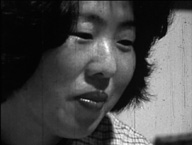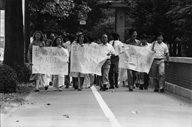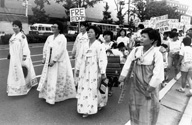Chronicling the Eighties
1 Takizawa Rinzo
Takizawa Rinzo, known for The May Day Trial (1969), made this film with Shin Ki-soo and others following Korean Envoys to Japan During the Edo Period. This film raises the question of what it means to live using one’s real name under the policy of assimilation advanced by the Japanese nation.
The Announcement of Park Chu-ja’s Real Name
(“Irumu/Namae: Paku Chuja san no honmyo sengen”) JAPAN / 1983 / Japanese / Color / 16mm / 50 min
JAPAN / 1983 / Japanese / Color / 16mm / 50 min
Director, Script: Takizawa Rinzo
Photography: Takaiwa Hitoshi
Sound: Sasaki Masahiko
Narrator: Ito Soichi
Planning: Irumu/Namae Production Committee
Producer: Shin Ki-soo
Production Company: Visual Culture Association
Source: Irumu/Namae Production Committee
Park Chu-ja, a second-generation zainichi, joined the anti-Vietnam war movement at her university, where she fell in love with the Japanese chairman of the student union. After much hesitation, she made her Korean origins known and announced her real name. Because of that name, however, she was rejected in employment exams. As the movement called “The committee to think about the Park Chu-ja issue” expanded its network, the staff who worked on Korean Envoys to Japan During the Edo Period (1979), including Shin Ki-soo, Takizawa Rinzo, and Takaiwa Hitoshi, began working on this film to record the steps taken toward ethnic independence.
2 Oh Deok-soo
Gaining experience as an assistant director at Oshima Nagisa’s production company, Oh Deok-soo established OH Kikaku and continues to make films about discrimination and human rights issues. This film documents the movement against the Alien Registration Law’s fingerprinting system, a symbol of the regulation of and discrimination against foreign residents of Japan.
 Against Fingerprinting
Against Fingerprinting
(“Shimon onatsu kyohi”)- JAPAN / 1984 / Japanese / Color / 16mm / 50 min
Directors, Narrative Structure: Oh Deok-soo, Mimuro Isamu
Photography: Shinoda Noboru, Ito Akihiro, Kajiwara Haruo, Shibazaki Kozo, Ishii Koichi
Editing: Shimizu Chieko
Sound: Honda Tsutomu, Fukuda Kazuo, Matsumoto Osamu
Narrator: Toura Rokko
Producers: Iijima Shigeru, Kumetani Chieko
Production Committee: Against Fingerprinting Production Committee
Source: OH Kikaku
On August 29, 1984, the Tokyo District Court handed down a guilty verdict against Han Jong-seok, who had opposed the fingerprinting system of the Alien Registration Law, the symbol of discrimination against and control over foreign residents of Japan. The cameras started rolling that day. By elucidating the historical background and implementation of the fingerprinting system and also by communicating the various reasons why the participants refused to be fingerprinted, the film asserts that the system is a contravention of human rights. The huge wave of anti-fingerprinting movements of the eighties raises questions about the present condition of zainichi and the present state of Japan.
3 Watanabe Takaaki
Watanabe Takaaki, a former member of Ogawa Productions and known for films such as Living on Kotobuki Street (1981), also addresses the anti-fingerprinting movement. In the film, the young zainichi make the very reasonable appeal, “In the country of Japan we want to create a society where we can live together.”
 Kawasaki, 1985: A Town on Fire
Kawasaki, 1985: A Town on Fire
(“1985 Kawasaki: Atsui machi”)- JAPAN / 1985 / Japanese / B&W / 16mm / 44 min
Director, Photography: Watanabe Takaaki
Sound: Fujita Shigeo
Location Sound: Matsumoto Tazu
Music: Sekiguchi Takashi
Producer: Yoshida Etsuko
Source: Cine [α]
This film was made after Yi Sang-ho, who was working at a preschool in Kawasaki at the time, was arrested for refusing to be fingerprinted under the Alien Registration Law. The anti-fingerprinting movement shocked the omoni (mothers) of the mostly second and third-generation zainichi Koreans who started it. Inspired by the conviction of their children’s generation, the omoni began putting their own lives on the line using their real names in public for the first time, refusing to be fingerprinted, and telling the unheard stories of their lives.
